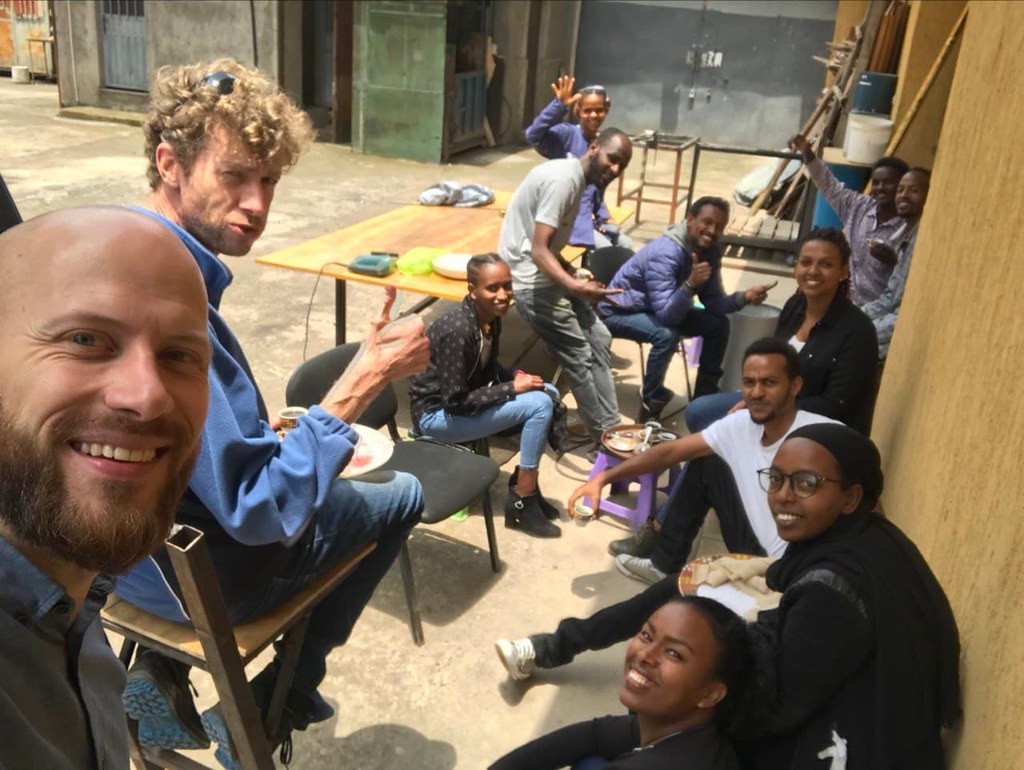I can hear you
By Tohru Inoue | Ethiopia in East Africa

Yohannes, Addis, Teunis and Joseph (L-R). (Credit Teunis van Woudenbergh.)
Addis, Yohannes, and Joseph had normal childhoods in rural Ethiopia. They enjoyed going to school with friends and playing sports. But that was interrupted when they fell ill one day and woke up not being able to hear. From one day to the next they could no longer hear the sound of their parents’ voices. They couldn’t hear the rooster crowing in the morning or the squeaky hinges. They couldn’t hear the sound of dishes clanging in the sink, nor the sound of rain.
In addition, they found that they were slowly losing their ability to communicate with their voices. It was disappearing.
The schools they were attending were not able to help them in their new circumstance. Participating in sports also became almost impossible so they had to leave. From their rural homes, they were sent to their uncles and aunts in the capital Addis Ababa where there are more resources. Eventually they found their way into a home for the hearing impaired and learned to communicate via sign language. There, they had to learn a new environment and make new friends.
Generally, the prospects are not good for the Deaf community in Addis Ababa. It’s also nearly impossible to be considered for gainful employment. A number of Deaf people end up in the streets begging. They become familiar with roundabouts and intersections. They can hang outside restaurants and shops looking for spare coins.
But one day, Addis, Yohannes, and Joseph met water project worker Andrew and were offered work. His water project is called Minch, which is the Amharic word for spring, and it produces household water filters. The simple aesthetic, sturdy construction and an international WHO certification makes it equally useful for internally displaced camps as urban households. In producing these filters, Minch has also created jobs for disadvantaged groups like the Deaf community.
When Andrew hired Addis, Yohannes and Joseph, there was a lot of training involved. Significant time was spent learning how to communicate. During that time the Minch team also learned how to listen. SIM worker Teunis who serves at Minch is hearing but, unable to speak sign language, he found his ability to communicate basic.
Teunis recalls how he had to read the room. He had to be observant and pay attention to the small cues. He found things like joy can be communicated more subtly. The hearing-impaired community have also learned how to read a hearing person who is unable to communicate.
Teunis remarks, “They see you coming and can figure out what you need before you ask.”
During work breaks, the team sits together and talks outside where the coffee is served. They give thanks for the food and drink with expressive gestures. They poke fun at one another and crack wide smiles. Their eyes focus in when there is a good story. To those who know how to listen, seeing this is energizing and life-giving. It would make you smile.
Practically speaking, being able to communicate helps them to address basic human needs like working and supporting family. But it all starts with people entering the conversation. It starts when there is space where people can speak and be heard.
Pray with us
• That many more who do not have an audible voice would be heard.
• For the ministry of Minch, providing clean water in Ethiopia.
Related stories

Doro Clinic outreach programmes reach the forgotten with care and the gospel
In South Sudan’s Maban County, medical teams from SIM’s Doro Clinic are reaching refugees who can’t reach them, bringing healing, hope and the gospel to the sick, the stigmatised and the overlooked.

Today for Tomorrow is rooting the next generation in Christ across Southern Africa
Today for Tomorrow began with just five children when SIM mission worker Graham, Jessie and Chris Maphosa saw a gap in how children were being discipled. While serving in Zimbabwe, Chris and colleagues developed the T4T training programme to help pastors and teachers share Christ-centered lessons in ways children could understand. Today, the ministry has grown significantly and continues to shine across the region.

Our call to care for the planet goes beyond recycling: lessons on creation stewardship
As a child growing up in Canada, I thought recycling was the best way to help the planet. The world’s problems were much too big for us as children, but finally, there was something we could do as well, right from our home. But my understanding of all my efforts were turned on its head when I chatted with Ian Ratcliff, SIM's Ministry Point Person for Creation Stewardship and Care.



